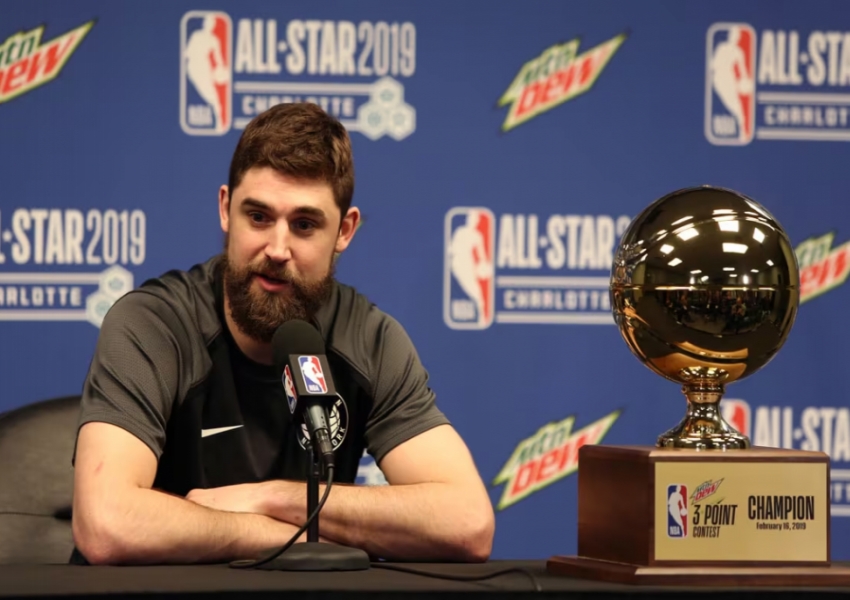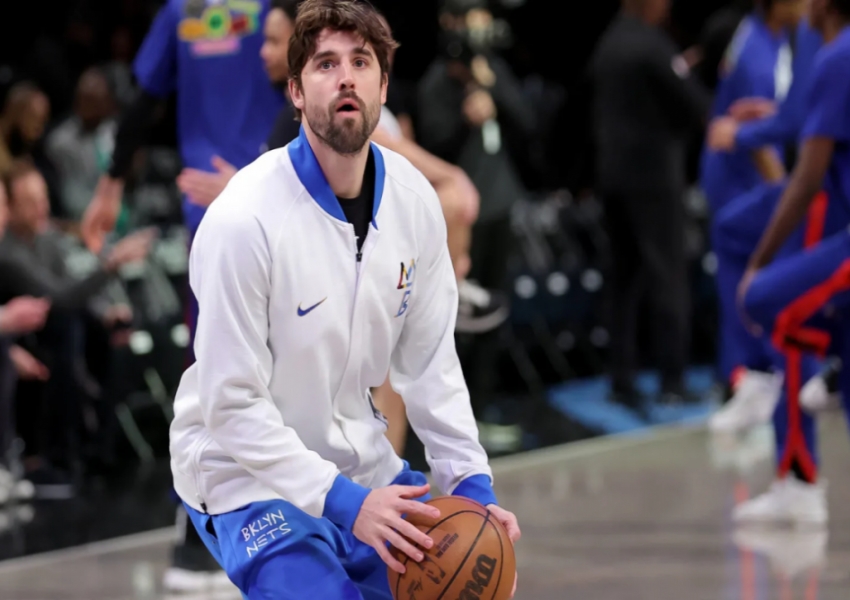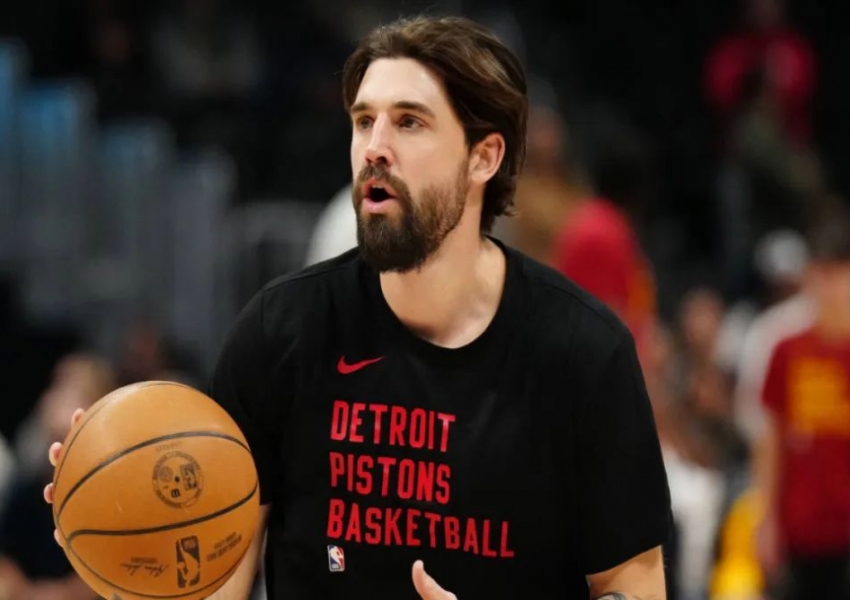Former Top Shooter and Team USA Member: Why No One Wants Joe Harris
Recently, the Boston Celtics extended sharpshooter Sam Hauser's contract for four years at $45 million. Hauser is a quintessential white shooter, and his contract extension inevitably brings to mind similar players like Duncan Robinson and Davis Bertans. Both Robinson and Bertans secured hefty deals of five years for $90 million and $80 million, respectively, due to their shooting prowess. Today's focus is on Joe Harris, another beneficiary of the three-point era. In 2020, Harris signed a four-year, $75 million contract, but this offseason, as his contract expired, he found himself unwanted in the free agency market. Not even a minimum contract came his way.

More accurately, Joe Harris has been out of the game for nearly half a year. Last offseason, the Brooklyn Nets traded him to the Detroit Pistons. During his time with the Pistons, Harris played just 16 games, averaging 10.6 minutes, scoring only 2.4 points per game, with a three-point shooting percentage of 33.3%. Due to his poor performance, the Pistons waived him in February before the season ended. Since then, no team has shown interest in Harris, and his NBA career may be nearing its end.

Reflecting on Harris's career, what is the assessment? As a second-round pick in the 2014 draft, Harris began his career with the Cleveland Cavaliers, where he was not heavily utilized. Over two years, he played in only 56 games, scoring a total of 139 points. Despite this, he demonstrated his shooting talent, with a 36.9% three-point shooting percentage in his rookie season. In the 2016 offseason, Harris became a free agent and signed a two-year, $2.03 million minimum contract with the Brooklyn Nets, which changed his destiny.

In his first two years with the Nets, Harris established himself in the team's rotation:
- In the 2016-17 season, he played 52 games, averaging 21.9 minutes and scoring 8.2 points per game, hitting 1.6 three-pointers with a 38.5% shooting percentage.
- In the 2017-18 season, he played 78 games, averaging 25.3 minutes and scoring 10.8 points per game, hitting 1.9 three-pointers with a 41.9% shooting percentage.
By this time, the NBA had fully entered the small-ball era, with the success of teams like the Warriors, Cavaliers, and Rockets highlighting the importance of three-point shooting. As a result, Harris received a two-year, $16 million extension in 2018.
In the 2018-19 season, Harris’s role expanded significantly. He played 76 games, all as a starter, averaging 30.2 minutes per game and scoring 13.7 points, 3.8 rebounds, and 2.4 assists, with a 50.0% field goal percentage and a 47.4% three-point shooting percentage. Harris was arguably the most accurate shooter in the league that season, leading in three-point shooting percentage (among those who made at least 100 three-pointers) and winning the NBA All-Star Three-Point Contest, beating players like the Curry brothers, Damian Lillard, Devin Booker, Danny Green, and Buddy Hield.
Additionally, Harris was selected by Gregg Popovich to join the 12-man roster for Team USA in the 2019 FIBA World Cup held in China. Despite Team USA's disappointing performance, Harris did well as a shooter, averaging 8.2 points with a 56% three-point shooting percentage.
However, Harris's biggest flaw also emerged that season. In the playoffs, the Nets were eliminated 4-1 by the Philadelphia 76ers. Despite being the league’s best regular-season shooter, Harris averaged only 8.8 points per game in the five playoff games, shooting a dismal 19.0% from three (4-for-21).
After 2019, the Nets underwent significant changes with the arrivals of Kevin Durant and Kyrie Irving. Harris thrived alongside these stars, averaging a career-high 14.5 points per game with a 42.4% three-point shooting percentage in the 2019-20 season. Though Durant was sidelined for the entire season, the Nets were not in a hurry to contend, and Harris secured another lucrative contract, a four-year, $75 million extension.
The 2020-21 season saw Durant’s return and James Harden's mid-season acquisition. Harris had an exceptional regular season, averaging 14.1 points and 3.1 three-pointers per game with shooting splits of 50.5% from the field, 47.5% from three, and 77.8% from the free-throw line. Historically, this ranked Harris second for the highest three-point shooting percentage in a season with 200+ made threes, behind only Kyle Korver's 2014-15 season (49.2% on 221 made threes).
In the first round of the playoffs, the Nets defeated the Celtics 4-1, with Harris continuing his hot shooting, averaging 13.4 points and 3.4 three-pointers per game on 51.5% shooting. However, in the second round, Harris struggled mightily. After performing well in the first two games against the Milwaukee Bucks, hitting 8 of 16 three-pointers and scoring 19 and 13 points respectively, Harris faltered in the next five games: he shot just 24.2% from three (8-for-33) and averaged only 7.0 points per game. The Nets were ultimately eliminated by the Bucks.
The Nets' elimination that year had several contributing factors: Kyrie Irving’s ankle injury, Harden’s hamstring issue, Durant’s big shoes, and Harris’s shooting slump. If Harris had made just one more open three in Game 7, the Nets might have avoided becoming a what-if story.
With three years remaining on his contract, Harris’s performance declined over the following seasons. In 2021-22, he played only 14 games before a season-ending ankle injury. Before the injury, he was averaging 11.3 points and 2.9 three-pointers per game on 46.6% shooting from three. The 2022-23 season saw the Nets gradually disintegrate, and Harris's performance dropped significantly. He went from being a starter to a bench player, averaging 7.6 points in 20.6 minutes per game, with 1.9 three-pointers on 42.6% shooting from three. In that year’s playoffs, Harris was a major disappointment again. In the first-round series against the 76ers, he averaged only 1.8 points and shot 8.3% from three (1-for-12).
After the season, the Nets traded Harris to the Pistons, leading to the scenario at the beginning of this story. Harris’s journey from a second-round pick, being discarded, and signing a minimum contract to earning a multi-million-dollar deal is a testament to his perseverance and shooting ability. Winning the Three-Point Contest and making Team USA were significant achievements. However, Harris’s defense has always been a liability. Post-injury, his already weak defense became even worse, and the poor environment in Detroit only exacerbated his struggles, ultimately leading to his release and current status as an unwanted free agent.
It’s worth noting that pre-injury, Harris was a solid player. Despite his defensive shortcomings, his shooting made him valuable. The main issue was his inability to perform under pressure. In three key playoff runs (2019, 2021, and 2022), he never delivered consistently.
Harris is only 32, and the offseason is long. It's possible that a team might take a chance on him with a minimum or non-guaranteed contract for his shooting. However, expectations should be tempered. Fans who remember the disappointment from his previous playoff performances are unlikely to forget.
Copyright Statement:
Author: focusnba
Source: FocusNBA
The copyright of this article belongs to the author. Reproduction is not allowed without permission.
Recommended Blog
- S-Tier Move! Champion Shooter Stays, $435 Million a Year, Celtics' Dismantling Countdown?
- Averaging 16+9! Is Third-Year Mobley Worth $224 Million Over Five Years?
- Latest 8-for-1 Trade Proposal: Warriors, Lauri Markkanen! The NBA's Wild West is About to Get Wilder...
- Promoted! China Basketball Permanently Bans Lin Wei? A Sophomore Already Leading His Team
- China's Basketball Future in Doubt: Lin Wei's Permanent Ban?
- A Sad Ending for Another Star: Once the Second Best Shooting Guard in the East, Now Out of Work for 150 Days
- Two Weeks Without an Offer: Why Isn't Anyone Grabbing a Former Near All-Star with Career Averages of 20+5?
- Why Isn't He Worth More? One Rising Star with 19+ PPG Gets $270M, Another Becomes Trade Bait
- $160 Million Over Four Years? Really? Averaging 14+4+1, Yet Asking for the Highest Salary on the Team
- From Rising Star to Suspended Player: How Long Can the NBA Tolerate Ja Morant's Self-Destructive Path?